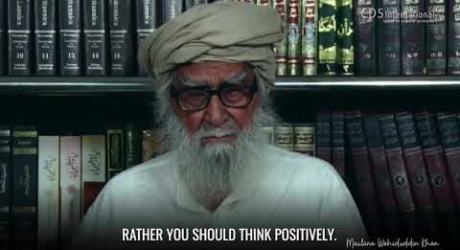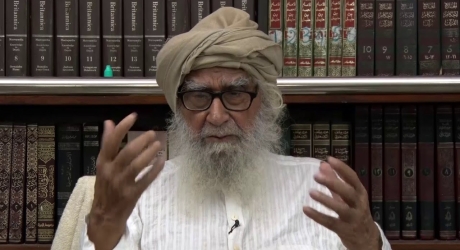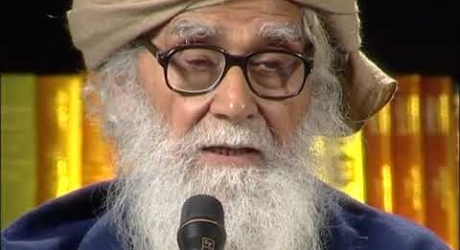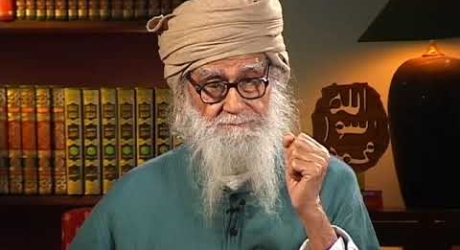According to a famous tradition, ‘our actions are judged by our intentions. The intention here is the equivalent of what is generally called spirit. It means that although there are many actions that in form appear to be morally acceptable, it is to the spirit of these acts rather than their external form that Islam attaches fundamental importance. From a Hadith, we learn that Prophet Muhammad, speaking of the Muslims of the future, predicted that only the external form of Islamic actions would survive. That is to say, the actions of the Muslims of the future would be lacking in inner spirit, and only the outer form of their religious observances would persist. People will remain ignorant of the true spirit of Islam so long as they are conversant only with its forms and attach importance only to the externals. It is easy to understand how extremism, or ghulu, stems from this flawed perception. In the early days of Islam, the spirit was alive and was accorded full attention. However, external rituals became more critical when degeneration prevailed among the later generations. It is a frequent occurrence.
Introduction
The Prophet Muhammad (Muhammad ibn ‘Abdullāh) was born in Mecca on 12 Rabbi-ul-awwal, 1431 A.H (570 A.D.). He received prophethood in 610 A.D and thus commenced his mission of acquainting mankind with the message of God. In making the Prophet Muhammad a resplendent landmark in human history, God bestowed greatest favour on mankind. Whoever seeks guidance cannot fail to see him, for he stands out like a tower, a mountain on the horizon, radiating light like a beacon, beckoning all to the true path. It is however most unfortunate that the Muslims have discovered the Prophet only at the level of miracles and feats. They failed to discover his role in initiating a process of change in history. For example, an Arabic phrase written to venerate the Prophet says, “He removed all darkness from the world.” It is ironical to notice that while on one hand, Muslims claim to be surrounded by problems on the other hand they say that Prophet Muhammad had solutions to all problems. If the latter is right, the question that arises is where have the Muslims erred?
Here I am reminded of an instance of my visit to America. While in conversation with him, I narrated to him the following anecdote about Swami Vivekanada. Clad in untailored saffron clothes, Swami Vivekanada was walking on the streets of America. A lady passer-by saw him and whispered to her husband that the man (pointing to Swami Vivekananda) does not seem to be a gentleman. As Swami overheard this, he went up to the lady and said, ‘Excuse me Ma’am, in your country, tailor makes man a gentleman, the country from which I come, character makes man a gentleman.’ Upon hearing this anecdote, my acquaintance observed that the teaching - ‘character makes a man’ - is no longer meant for domestic consumption of Indians, it is used only as an export item.
I realized that the case of present-day Muslims was much the same. The teachings of the Prophet have become an item of export and are not meant for domestic consumption. As I thought about this, I came across a verse form the Quran which states,
You have indeed in the Prophet of God a good example. (33:21)
Muslim interpreters attributed pride to the word “good”. Instead of introspecting and emulating the example of the Prophet Muhammad, the Muslims made his life a source of pride for themselves. They no longer concerned themselves with receiving guidance from the sayings and actions of the Prophet Muhammad.
I was once invited to a town in Uttar Pradesh where I had to speak about the Prophet Muhammad. When my speech got over, an elderly person walked up to me and said you made no mention of Seerat (life of Prophet) in your talk. I was appalled to hear this and asked what made him say so. He said that the life of the Prophet was all about miracles and feats, of which I made no mention.
The biographies of the Prophet Muhammad written by Muslim biographers speak the language of miracles. They barely touch upon his teachings. This is because the concern of present-day Muslims is to feed their pride which is possible only by talking about the ‘miracles’ performed by the Prophet. This is why the Muslims get provoked at cartoons of Prophet because such instances hurt their ego or pride. They take an offence to it and react.
Model of the Prophet Muhammad
In 1949, three idols were unearthed from the premises of the Babri mosque at Ayodhya. This triggered violent reactions from Muslims all over. Huge resources were spent to popularize the issue but what did all this result in? The mosque was demolished and today a makeshift temple exists in its place.
Contrary to this, when the Prophet began his mission in 610 AD, Kabah, the Centre of Tauheed built by Prophet Abraham was under the dominion of idol worshippers and housed over three hundred and sixty idols. But the Prophet did not react. Neither he made fiery speeches nor did he speak the language of protest. In fact the verses revealed to the Prophet during this period sought purification of mind. The verse reads,
Purify your garments (mind). (74:4)
Instead of ordaining the Prophet to purify the Kabah of the idols, the verse sought purification of the mind of individuals. The focus was on purification of the hearts of people so that they can be freed from negative thinking. This process of deconditioning inculcated strong faith and high character in these men. As they entered the fold of Islam, they removed all the idols from the Kabah themselves. The concern of the present-day Muslims’ is no longer to learn from the model of the Prophet of Islam, but to establish their superiority. This is the reason they enjoy debates, confrontations and appreciate rhetoric to satisfy their sense of pride.
Well-wishing for all
Different tribes of Mecca worshipped different deities, idols of which were placed inside the Kaaba. This was why Kaaba was held sacred. Once an idol-worshipper Tufail bin-Amr came to the Prophet to enquire about the message he preached. Upon listening to the message of monotheism, Tufail was so inspired that he embraced Islam. A keen well-wisher, he sought to propagate the message of Islam to his tribesmen. However when he did so, his tribesmen became very angry and beat him up. He returned to the Prophet disheartened and angry and asked the Prophet to pray for badluck to befall his tribe (Daus). Instead the Prophet prayed for the rightful guidance of the clan of “Daus”.
While the Prophet unilaterally forgave all those who inflicted atrocities on him or his Companions, the present-day Muslims do prayers seeking bad luck and wishing ill for their opponents.
(Seerah Ibn Hisham)
It is because they remain immersed in ill-feelings that the Muslims are not able to find a solution to their problems. Instead of emulating the example of the Prophet Muhammad, the present-day Muslims have made him a reference point for establishing the pride of their community.
Once a Bedouin (from the old tribe of Arabia) entered the premises of the Masjid-e-Nabwi and urinated there. This infuriated the Companions and they wanted to beat him but the Prophet strictly dissuaded them from taking any action against that man. Instead, the Prophet asked those present to pour a bucketful of water and clean the place. (Al-Bukhari)
What was the result of such behaviour? Upon returning to his tribe, the Bedouin narrated the series of events and told about how Muhammad neither beat nor abused him. His tribesmen were so influenced by the conduct of the Prophet Muhammad that they sent a delegation to understand the religion that the Prophet preached. Subsequently, all of them embraced Islam. Contrary to this, if today someone shows disrespect to the mosque, the Muslims get highly offended so much so that they start fighting, burn shops, houses and disrupt daily work. Can such behaviour yield positive result? No, yet Muslims do not disengage themselves from such acts.
Choosing the easier option
In October 1989, the Kashmiris started the so-called musalla Jihad and bombed government buildings etc. and disrupted daily activities. Just two months prior to this, I had visited Kashmir and addressing a gathering at the Tagore Hall, I had said that where the Prophet spilt water (followed peaceful action) and achieved success, the Muslims are shedding blood (violent action). They (Muslims) however, must realise that continuing on the path of violence will never let success come their way.
Here am reminded of my conversation with a few Palestinian scholars who had come to visit me. During the course of our talk, they asked my opinion about the situation at Gaza. I told them the following Hadith,
When the Prophet had to choose between the two, he always picked the easier option.
(Al-Bukhari)
Explaining the Hadith, I said that easy option was to work peacefully and harder was to direct efforts to the use of ammunition etc. In choosing the harder option (violence), not only did they go against the Prophet but suffered sheer devastation. Today, Palestine does not even have the land they were allotted in 1949. They have been forced to remain on a small strip in Gaza etc. The Scholars did not agree with me and entered into a verbal tautology. They could not realize that this is the eternal law of universe and that every situation provides for both hard and easy options. It is for us to choose.
A Hadith states,
God grants to non-violence what He does not grant to violence. (Muslim)
The above means that fruitful result can be had only by adopting peaceful course of action. The Muslims therefore, need to heavily introspect and re-assess their actions. Instead of deriving pride from the life of the Prophet, they must take lesson and assess that if his (Prophet) teachings provide a solution to every problem, why still are they grappling with so many unsolved issues.
It is the need of the hour that the Muslims address this contradiction. While on one hand, they claim that their Prophet brought the solution to all problems on the other they claim themselves to be a deprived community. It is time that the Muslims address this paradox and re-assess their approach in the light of the teachings of the Prophet so that they may come to the right path before its too late!











